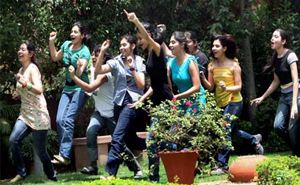 New Delhi, Jun 22: Candidates from the Madras zone bagged the first two ranks in the Indian Institute of Technology Joint Entrance Exam (advanced), or IIT-JEE, whose results were announced on Friday. The third and fourth rank holders are from Delhi.
New Delhi, Jun 22: Candidates from the Madras zone bagged the first two ranks in the Indian Institute of Technology Joint Entrance Exam (advanced), or IIT-JEE, whose results were announced on Friday. The third and fourth rank holders are from Delhi.
“The topper, Pallerla Sai Sandeep Reddy, has scored 332 marks out of 360, while the second-position holder, also from the Madras zone, has scored 330,” said HC Gupta, Organising Chairman, IIT Delhi.
He added that candidates from Delhi zone scored 329 (third rank holder) and 323 (fourth rank holder). The fifth-rank holder is from Mumbai.
According to Gupta, for the first time in the history of IITs, girls made it to the top-10 ranks. “From the Delhi zone, Aditi Laddha from Ratlam, Madhya Pradesh, has scored 320. She is the sixth-rank holder, while Sibala Leena Madhuri from Tirupati (Madras zone) grabbed the eight rank with a score of 314,” said Gupta.
City boy at 99
Ananth V Kamat of Bangalore was one of the top scorers for Karnataka, with an All-India Rank of 99. Ananth, who was elated with the results, has no plans of joining any IIT. He has already secured admission into four-year BS programme at the prestigious Indian Institute of Science.
JEE (main), which took place in May this year, was an eligibility test for the JEE (advanced). A total of 1,52,351 candidates were eligible to write the JEE (advanced) exams, out of which 1,26,704 candidates registered, 1,15,971 appeared and 21,110 qualified.
“Of those who qualified 18,718 were male and 2,392 female. Females made up around 11 per cent of those who qualified for counselling, which is a slight increase from the last year,” said Gupta.
According to officials, most of the approximately 10,000 candidates who registered but did not appear for the exams were women. “As we have started free online registration for girls, registrations took place. Many female candidates did not appear for the exam. We cannot pinpoint one particular reason for this,” said another official.
The official said the overall distribution of qualified women is homogenous. “We cannot say who fared well between girls and boys. Considering the total number of girls who qualified, there should be at least one for every 10 ranks, which is not the case here, as two women have made it to the top-10. Thus, the distribution is more or less homogenous,” added the official.
Gupta said one of the primary reasons why roughly 26,000 candidates who were eligible to take the exam did not register was that many wanted to get into state-level engineering institutes, which ask for the results of the JEE (main). “Because the new exam pattern was implemented for the first time this year, till May 14 (end of JEE mains) we did not know which city has how many students who have applied. Fortunately, our assumption was correct and the exam was conducted without any problem,” he said.
This year, IITs will also send the hard copies of the results and necessary counselling schedule to all the 14,336 candidates who have been selected for counselling.







Comments
Add new comment